MHR
MANUFACTURED HOUSING REVIEW

News and educational articles to help you run your business in the manufactured home industry.
IN THIS ISSUE:
Higher Rents or Re-Development: It’s Simple Economics
Weinstein’s World
Should You Have an Employee Manual?
The Necessity of Checking Your Community Valuations Three Times ... and much more!
DECEMBER 2017
Table of Contents - DECEMBER 2017 ISSUE 3 Publisher’s Letter By
Kelley,
Manufactured Home Industry Rejoices at News that Consumer Financial 11 Protection Bureau Director Richard Cordray Plans to Step Down By Della Holland Senate Banking Committee Draft Gives Manufactured Home 13 Retailers Relief from the Dodd-Frank Act By Deanna Fields 9 Changing Perceptions, Changing Financing in Manufactured Housing By Mr. Ben Kadish 8 Weinstein’s World By Patsy Norris 15 Should You Have an Employee Manual? By Kurt D. Kelley, J.D. 4 Higher Rents or Re-Development: It’s Simple Economics By Frank
19 The Necessity of Checking Your Community Valuations Three Times By Dave Reynolds
Kurt D.
J.D.
Rolfe
By Kurt D. Kelley, J.D. Publisher
This has been a solid year for the manufactured housing industry. Home sales are up and Manufactured Home Community values have risen. Affordable housing for working people continues to be in high demand in most markets.

Looking forward, there’s more good news. Richard Cordray, the Former Director of the Consumer Finance Protection Bureau has stepped down. He likely will be replaced by a Director who does not promulgate policies that are discriminatory against manufactured housing. Mr. Cordray has created regulations which decrease consumer access to financial services and increase their costs. Also, unemployment levels are near historical lows. When there are more working people, there’s more people willing to rent or purchase manufactured homes. Next year should be another strong one for our industry.
Enclosed you’ll find some valuable and interesting articles targeted toward both small business operators and the manufactured housing industry. The information they provide will help you operate a better more profitable business. If you’ve got something that you’d like to share with this industry via the Manufactured Housing Review, please send it to us and we’ll respond promptly. Thank You!
Kurt D. Kelley, J.D. Publisher kkelley@manufacturedhousingreview.com

DECEMBER 2017 ISSUE • 281.460.8384 • ManufacturedHousingReview.com - 3 -
Publisher’s Letter
Higher Rents or Re-Development: It’s Simple Economics
There are tiny, misguided non-profit groups that would have you believe that rising manufactured home community lot rents are an evil force. These are the same folks that have been instrumental drivers in depriving Americans access to purchasing manufactured homes by portraying them unfairly as “high-cost” loans (which was just debunked with the passage of H.R. 1699 the “Preserving Access to Manufactured Housing Act”). Apparently, nonprofit groups failed to study economics in college, because their plans often actually harm people more than they ever help them. And if these groups have their way, they are setting the stage for many manufactured home community residents to be left homeless.
A short economics lesson on real estate
In the beginning, there was raw land. And there’s just so much of it. Each parcel of land has a myriad of potential uses, based on location and zoning. Out in the country, it’s mostly farm land, or left to grow wild. But inside of any metropolitan area – particularly the heart of the city – the use options run from residential to commercial. And each of these uses represents a different income stream and value of the property. At the top of the food chain are office and retail uses, followed by lodging, industrial, multi-family and – at near the bottom – manufactured home communities. When one use is more valuable for that piece of land, the existing use is bulldozed and re-developed into that “higher use”. It happens across America every day, including the demolition of high-rise buildings for the construction of new ones, and the destruction of old stadiums for new shopping malls and entertainment developments. The bottom line is that the use of a parcel of land is 100% based on the economics of what the best use of that land is, and the best use is identified by what creates the most income or derives the highest price paid. Remember that Manhattan was just farmland when John Jacob Astor assembled that parcel in the 1700s – and today those tracts are multi-story buildings since that’s a higher use than growing crops.
An even shorter one on manufactured home communities
Manufactured home communities have only one income source: lot rent. Higher lot rents create higher net income, and higher net income creates a higher value for the parcel. It’s not rocket science. At the same time, manufactured home communities are considered one of the lowest uses for land, based on value per square foot. So there is not much margin for error when evaluating whether to keep a manufactured home community in that use versus apartments or some commercial use. Remember that the average manufactured home community lot rent in the U.S. is around $280 per
By Frank Rolfe
month, while the average apartment rent is $1,200. Take the case of a manufactured home community in Austin, Texas that just closed to be re-developed into apartments. The difference in values for the land, based on use, is millions of dollars. It’s easy to understand why, since the difference between Austin apartment rents and manufactured home community rents exceeds $1,000 per month. How could this have been stopped, and those households left intact on those lots? Simple. Higher lot rents. If you do the math, the Austin property could have stayed in its current form if the lot rents had been much higher.
Higher rents are, in fact, the only solution to re-development
Non-profits will have to make a choice as to whether they want manufactured housing communities to be re-developed or not. Because that’s the bigger question. Low rents equal certain re-development eventually. Higher rents create stability for the property. Every time these groups create issues for community owners, they effectively are signing the death warrant for the property’s use as a manufactured home community. It’s not hard to understand. And it’s clearly a bad idea to push the narrative that rents should not increase.
And higher rents have other benefits for residents
Higher rents allow the community owner to make necessary capital improvements. It also allows the owner to employ professional management, which pays huge dividends for the resident. Most non-profits are incorrect in thinking that residents want to live as cheaply as possible. They don’t want “cheap”, they want value. It’s no different than when you’re driving down the highway and have to pick a place to stay. You can’t afford the Westin, but you also don’t want the Tiki Motor Lodge with Norman Bates as the proprietor. You want the Holiday Inn Express, because you want something safe, clean and properly managed – even though it costs six times more than the Tiki. Quality and price, of course, are completely interrelated.
But there are some other efforts that could help, as well Congressman Keith Ellison proposed a tax credit for those community owners who sell their property to be continued as a manufactured home community, as opposed to selling it for re-development. It didn’t go anywhere in Congress, but it was a great idea. Programs that reward community owners for adhering to that land use could sometimes be the edge when a good offer comes in on any community by a developer. Hopefully, more folks in Washington will realize this in the years ahead.
DECEMBER 2017 ISSUE • 281.460.8384 • ManufacturedHousingReview.com - 4 -
Higher Rents or Re-Development: It’s Simple Economics cont.
Conclusion
Anyone who thinks that lower rents are the solution to solving the affordable housing crisis in America is extremely misguided. That’s merely a short-term approach. Higher lot rents are the only way to ensure that many manufactured home communities still exist, in many markets, in the years ahead. The sooner everybody figures this out, the better for those residents that are facing re-development in the near future. While there are many productive issues that nonprofits could work on – such as lobbying Congress for the Ellison tax credit program – the issue of pushing to keep rents low is not one of them.

Frank Rolfe has been a manufactured home community owner for almost two decades, and currently ranks as part of the 5th largest community owner in the United States, with more than 23,000 lots in 28 states in the Great Plains and Midwest. His books and courses on community acquisitions and management are the top-selling ones in the industry. To learn more about Frank’s views on the manufactured home community industry visit www.MobileHomeUniversity.com.

DECEMBER 2017 ISSUE • 281.460.8384 • ManufacturedHousingReview.com - 5 -
TOO COLD TOO HOT




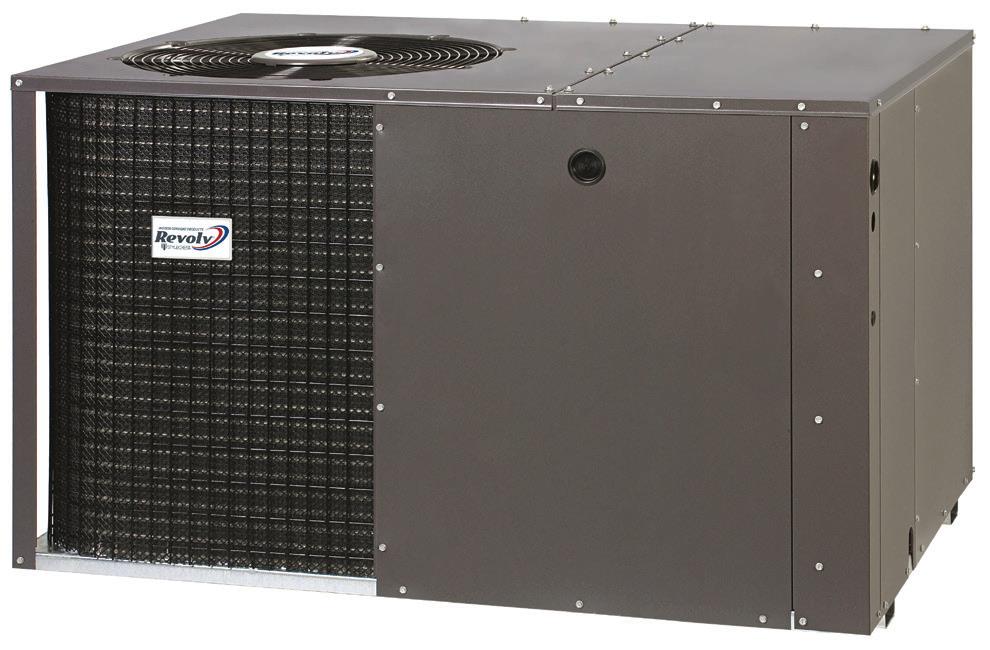

JUST RIGHT. Providing quality HVAC products that are just right for manufactured housing. 800.945.4440 | www.stylecrestinc.com
Weinstein’s
World
It’s imperative that business managers understand the realities of operating a business in our current society. There is a new reality and enforceable standard against sexual harassment, sexual interplay, and sexual interaction in the workplace. Former Miramax film producer Harvey Weinstein’s allegedly predatory, rude, illegal, and sometimes violent conduct gave many women the fortitude to say, “enough is enough.” With the light now shinning on similar illegal and/ or improper behavior by the California Legislature, assorted Hollywood bigwigs, and a gaggle of politicians, any remaining psychological barriers to complaints are being eliminated.
There’s never been a better time to review your sexual harassment policy. It’s time to make certain your workforce knows what is considered sexual harassment and that any form of it will not be tolerated. Here are examples of conduct that should not be tolerated in any workplace, no matter how small and under the radar or how big and prestigious your company is:
1. Commentary about physical attributes of another employee, particularly anything below the neck. Examples include, “your calves are really well formed,” “your figure reflects you’ve been working out a lot,” and “that skirt fits your form perfectly;”
2. Sexual innuendo joke telling to a group of people, even if all appear to be laughing and enjoying the content. It’s not uncommon that some are quietly uncomfortable;
3. Dating between a manager and a subordinate, no matter how happy they may seem to be;
4. Telling a woman, she’s not feminine enough or a man, he’s not masculine enough; and
5. Any of the above or other clear sexual harassment by clients or suppliers.
If you receive a complaint about sexual harassment from an employee, you must handle the complaint itself properly too. Failure to do so may generate more liability than the underlying sexual harassment itself would have. Five common management mistakes are:
By Patsy Norris
1. Being dismissive – management should take all complaints seriously. Take notes and investigate even if the investigating manager believes the alleged underlying acts don’t amount to actionable sexual harassment charges. Actions don’t have to be frequent or severe to be actionable;
2. Victim blaming – do not begin with asking what the complainant was doing when the alleged offense(s) happened. And don’t tell the complainant that she/he is being too sensitive;
3. Improper reporting policies – if any manager receives a complaint, they should take it seriously and either handle the complaint or deliver the complainant to the manager who will handle the complaint. Don’t simply tell a complainant, “I’m not the one to tell that to. Go see Lucy in HR. I’m busy.” Action, even if it’s only documentation, must be taken. Signed written statements should be taken and preserved;
4. Failing to inform an accused that anti-retaliation laws apply - it’s often best to not have the accused contact the accuser at all, even with an apology;
5. Removing the complainant from a work group or account to avoid the alleged harasser - versus removing the alleged harasser
It is challenging to manage these issues. We live in a world where sexual provocation and enticement are the norm in advertisements, magazines, movies, tv, billboards and our computer screen. Even news reporters are usually selected partially due to their sexual attractiveness. Today is the time to make sure your company is compliant with these rules and standards.
Patsy is a Sr.
Manager
a
DECEMBER 2017 ISSUE • 281.460.8384 • ManufacturedHousingReview.com - 8 -
Account
with Mobile Insurance,
commercial specialty insurance agency writing insurance for community owners and retailers nationwide. Patsy visits and works with about 300 business owners regarding all aspects of their business risk management, and is on the front lines when claims of all sorts arise.
Changing Perceptions, Changing Financing in Manufactured Housing
Manufactured Housing Communities are rapidly evolving— and so have sources of capital for the communities. Over the two-plus decades that Maverick Commercial Mortgage has been involved in funding loans for manufactured housing communities (MHC) across the Midwestern United States, the perception of the category, the ownership structures, and the types of deals have all evolved.
Not the Stereotypical Trailer Park
Many MHCs are located in secondary markets and provide safe and secure affordable housing for families and seniors. Typically, each house has its own parking and outdoor space on private streets with limited access from people that are not residents of the property. In other words, MHCs are not very different from suburban style subdivisions.
MHC owners and managers strive to provide nice communities with amenities including community centers, playgrounds, swimming pools, and park-like settings. The MHC owners are often responsible for utilities, garbage pickup, enforcement of rules and regulations, marketing and installing of new houses, and removal of old obsolete houses. The managers run the communities like a small municipality, maintaining the properties and reinvesting to provide value for their monthly rent.
The Housing Downturn and Manufactured Home Communities
Ownership and management of MHCs is much more intensive and complicated than it was 25 years ago. Before 2008, most properties were operated effectively by mom-andpop businesses. Then, during the sub-prime mortgage era, many MHC residents moved into conventional housing. This coupled with the struggling economy to create significant vacancies in many MHCs across the country – especially in Michigan, where the auto industry plummeted.
The housing downturn caused many mobile home dealers, who had historically handled sales and marketing of mobile homes on behalf of MHC owners, to go out of business. The closings created new responsibilities for MHC owners.
MHC owners needed to start buying and selling or renting houses to new residents to fill up the vacant pads at their properties. Many older communities needed substantial renovations, such as new streets, pads, sidewalks, and landscaping. MHC owners needed to access significant capital to complete renovation projects, bring in new inventory, and provide financing to residents.
Sophisticated Financing for an Evolving Category
To find this capital, MHC owners have to turn to new financing
By Mr. Ben Kadish, CEO and President, Maverick Commercial Mortgage
sources—and mortgage brokers who can connect them to these lenders and investors.
It’s critical for MHC owners to work with finance professionals that have the expertise and relationships to source financing for turnaround properties, new acquisitions, and bridge loans for new home inventory. You’ll want to find a lender that has funded permanent loans with CMBS lenders, agency lenders, and banks in amounts that have range from $1 million up to $50 million. Your lender should have experience in funding all types of communities and community improvements from 100-pad family parks to 250-pad 5-star senior housing parks.
Our company has financed parks in Wisconsin, Iowa, Colorado, Missouri, Indiana, Michigan, Illinois, Minnesota and Texas for borrowers with large portfolios and for individual park owners. We have secured rental home portfolio financing for park owners, and we have financed first mortgage loans, with funds available to allow for owners to acquire additional houses to fill up the properties.
A thorough money source will visit the properties prior to presenting the loan requests to the lenders, so that they are showing the parks in the best light for the owners, with a business plan for upgrades to cover any deficiencies as part of the loan request. In many circumstances, we secure bridge loans to allow for the repositioning and upgrades at the property, and then provide permanent financing down the road. We have been successful in allowing the borrows to pull out significant equity, or cash out proceeds at the time of permanent financing.
A good lending source should also complete loan packages for borrowers that allow for lenders to quote, process and close bridge and permanent loans in an average of 45-60 days. Quality financiers will underwrite the properties in a manner that allows the lender, borrower and appraiser to agree on the income and expenses for underwriting, which is necessary to close loans in this highly regulated lending environment. It’s critical to fully document the request, so that the lenders can quote loans and close under the terms agreed upon up front by the borrowers. Choosing a capable and experienced lender is one of the best decisions a community owner can make.
Ben Kadish is the president and founder of Maverick Commercial Mortgage, Inc., and is a mortgage banking professional with more than 34 years’ experience. He has completed more than $300 million of financing for manufactured home communities over the past 22 years.
DECEMBER 2017 ISSUE • 281.460.8384 • ManufacturedHousingReview.com - 9 -
The Midwest’s Premier Event for Manufactured Housing Professionals
Stay at The Crowne Plaza
Hotel shuttle service is available from the airport to The Crowne Plaza hotel, and from the hotel to the Kentucky Exposition Center. Book now while event rates remain! Mention the Midwest Manufactured Housing Show for discounted room rates.
The Crowne Plaza
830 Phillips Lane
Kentucky Exposition Center
January 17-19, 2018 • Louisville, Kentucky
For more than 50 Years The Louisville Manufactured Housing Show Has Brought You The Very Best Homes, Products and Services in the Industry
We look forward to seeing you at the Kentucky Exposition Center in Louisville, Ken., for what promises to be the very best Louisville Manufactured Housing Show yet!
The manufactured housing industry is booming, and nearly 3,000 of the most enthusiastic and active professionals from more than 960 manufacturers, retailers and service providers will be attending and available to talk about their offerings.
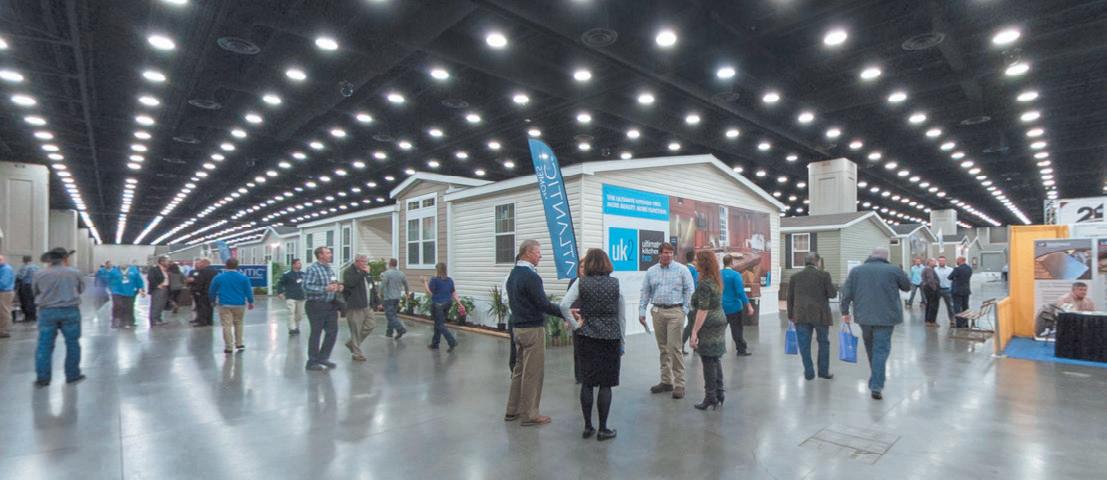
Do not miss this chance to cut deals and make big plans for 2018!
The Louisville Show provides all the newest manufactured home designs, features the latest in technology trends, and allows you to pick up, poke at and test the most talked about amenities and home options in the industry.
Kreil Moran MMHF Chairman
Louisville, KY 40209 (888) 233-9527
The Louisville Show website
The Louisville Show website, sponsored by MHVillage, provides MH Professionals with the latest information and news about the Midwest’s largest industry gathering. Go to www.TheLouisvilleShow.com for updated information on registration, schedule, attendees and Louisville attractions.
2018 Louisville Show Hours
Wednesday, Jan. 17
9am – 5:30pm Exhibits Open
Thursday, Jan. 18 9am – 5:30pm................................................ Exhibits Open
Friday, Jan. 19
9am – Noon ................................................... Exhibits Open
KMHI/MHI Appreciation Reception
Co-sponsored by KMHI and the Manufactured Housing Institute
You are cordially invited to: Our Annual Appreciation Reception
Wednesday, Jan. 17, 2018 from 5-7 p.m. The Crowne Plaza Hotel
Cocktails and Hors D’oeuvres will be served
The Ideal Venue!
Participate in the Largest Indoor Display of New Manufactured Homes in the Country
The Kentucky Exposition center in Louisville, Ken., provides 1.3 million square feet of vendor, attendee and presentation space. The venue is seven minutes from central Louisville, where those attending the 2018 Louisville Manufactured Housing Show can explore Muhammad Ali Center Museum, Bourbon Trail Tours, The Louisville Slugger and Kentucky Derby museums, as well as droves of amazing restaurants and a vibrant nightlife scene.
DECEMBER 2017 ISSUE • 281.460.8384 • ManufacturedHousingReview.com
Advertisement
Manufactured Home Industry Rejoices at News that Consumer Financial Protection Bureau Director Richard Cordray Plans to Step Down
Richard Cordray, director of the Consumer Financial Protection Bureau (CFPB), said he plans to leave his job on November 30th, 2017, ending a rift-filled six-year tenure as the first head of the regulatory agency created after the financial crisis.
His departure paves the way for President Donald Trump to appoint a new leader, who will likely overhaul the policy and the structure of the agency, a subject of political bickering since its establishment in 2011. According to the Wall Street Journal, the Dodd-Frank Laws and the CFPB have been the source of more lobbying expenditures than all other laws combined since its inception. Unlike many other agencies where Trump appointees have begun rolling back regulations, the CFPB has kept pursuing its longstanding intensive regulatory agenda under Mr. Cordray, a Former President Obama appointee.
The manufactured housing industry has long lobbied that the CFPB rules discriminated against it and in favor of more expensive housing options. Many of the rules and regulations promulgated by the CFPB add so many additional consumer costs that when all these costs are included within a manufactured home loan, it almost assuredly means the loan will be treated as a high cost loan. Most banks have elected not to issue any loans deemed to be high cost due to the substantial costs and regulations associated with such a designation. Cordray and the CFPB have been deaf to industry concerns about hurting consumers with counterproductive agency regulations.
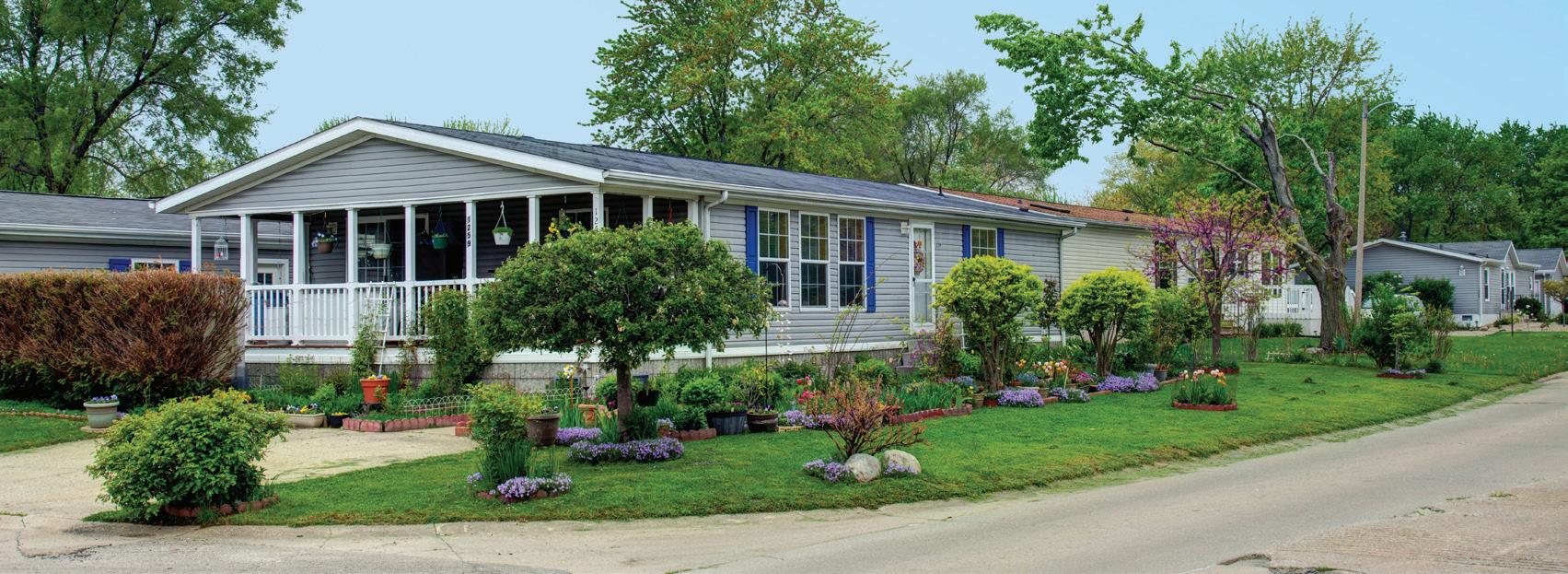 By Della Holland, Assistant Editor
By Della Holland, Assistant Editor
When created, the Director of the CFPB was given unprecedented wide powers not subject to Congressional oversite. Constitutional challenges to these powers remain are being litigated in the court system today. Replacing Cordray will fall to President Donald Trump who has named Mick Mulvaney, a long-time critic of Cordray’s and the CFPB, as Cordray’s replacement. While at the same time, Cordray has named his assistant to fill the remaining seven months of his assigned term. The CFPB rules give Cordray the power to name a replacement, however other Federal Law makes it clear the President has that authority. As of this writing, a Federal Court and the Attorney General have said that the President’s appointee is who will take over as the new Director. Any replacement shall remain as shielded from Congressional or Presidential oversite as Cordray was up and until the Courts rule otherwise. It’s widely expected that President Trump’s appointee, Mulvaney, will roll back many CFPB regulations. Whoever is ultimately appointed must be approved by the Senate.
Holland is an Editor for the Manufactured Housing Review. She owns and operates real estate investments and acts as an Administrative V.P. in the Manufactured Housing Industry.
DECEMBER 2017 ISSUE • 281.460.8384 • ManufacturedHousingReview.com - 11 -
Ms.

Senate Banking Committee Draft Gives Manufactured Home Retailers Relief from the Dodd-Frank Act
The Senate Banking Committee released a bipartisan agreement to clarify that a manufactured housing retailer or seller is not considered a “loan originator” simply because they provide a customer with some assistance in the mortgage loan process. This is a key tenet of the Preserving Access to Manufactured Housing Act, which excludes manufactured housing retailers and sellers from the definition of a loan originator so long as they are only receiving compensation for the sale of a home.
MHI successfully argued that just as a real estate agent’s sales commission does not make him or her a loan originator under current law, a similar distinction is needed for those selling manufactured homes. While they are only in the business of selling homes and do not originate loans, manufactured home retailers and sellers currently run the risk of being considered mortgage loan originators. This is problematic because loan originators must comply with licensing or qualification requirements that are completely unrelated and irrelevant to manufactured home retailers and sellers. This agreement affirms MHI’s longstanding position that it is inappropriate for a manufactured housing retailer - whose business is to sell homes and who is not receiving any gain or compensation for minimally helping the borrower with the mortgage loan process - to be subjected to costly and labor-intensive activities that are clearly designed to apply to the actual individual making the mortgage loan.
The manufactured housing language was a part of a bipartisan regulatory reform package drafted by Senate Banking Committee Chairman Mike Crapo (R-ID). A bipartisan group of nine Republicans and nine Democrats cosponsored the measure, including: Mike Crapo (R-Idaho), Bob Corker (R-Tennessee), Tim Scott (R-South Carolina), Tom Cotton (R-Arkansas), Mike Rounds (R-South Dakota), David Perdue (R-Georgia), Thom Tillis (R-North Carolina), John Kennedy (R-Louisiana), Jerry Moran (R-Kansas), Joe Donnelly (D-Indiana), Heidi Heitkamp (D-North Dakota), Jon Tester (D-Montana), Mark Warner (D-Virginia), Tim Kaine (D-Virginia), Angus King (I-Maine), Joe Manchin (D-West Virginia), Claire McCaskill (D-Missouri), and Gary Peters (D-Michigan).
By Deanna Fields
The provision is in Section 107 of the package, which is within the title of the bill dealing with improving consumer access to mortgage credit. Specifically, Section 107 amends the Truth in Lending Act (TILA) to exclude from the definition of “mortgage originator” an employee of a retailer of manufactured or modular homes who does not receive compensation or gain for taking residential mortgage loan applications while maintaining consumer protections. Senator Joe Donnelly (D-IN), author of the Preserving Access to Manufactured Housing Act (S. 1751) and long-time supporter of manufactured housing, strongly advocated for inclusion of this important consumer access provision in the package.
The Senate’s bipartisan reform package is expected to be considered by the Senate Banking Committee in the coming weeks. MHI will continue working with its champions as the package moves through the legislative process.
The inclusion of this language in the Senate’s financial regulatory relief package is the result of MHI’s persistent efforts to ensure the needed changes contained in the Preserving Access to Manufactured Housing Act are passed into law as soon as possible. In addition to the Senate regulatory reform package, the full Preserving Access to Manufactured House Act was passed as a part of the House’s financial reform package (H.R. 10) in June. In September, the House also passed the bill’s provisions as a part of its Fiscal Year 2018 Appropriations package.
DECEMBER 2017 ISSUE • 281.460.8384 • ManufacturedHousingReview.com - 13 -
Update from Deanna Fields, Executive Director of the Manufactured Housing Association of Oklahoma and Active Member of the Manufactured Housing Institute.
The Midwest’s Premier Event for Manufactured Housing Professionals

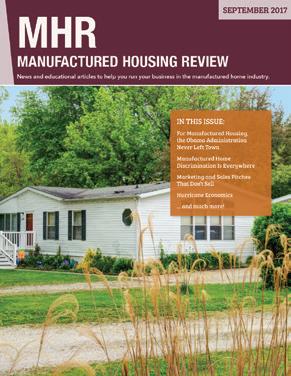

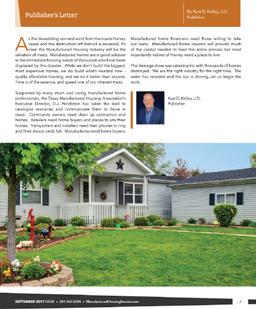
The Louisville Show is your source for the newest manufactured home designs, the latest technology, the best suppliers, and the newest amenities and system-built options available in the industry.

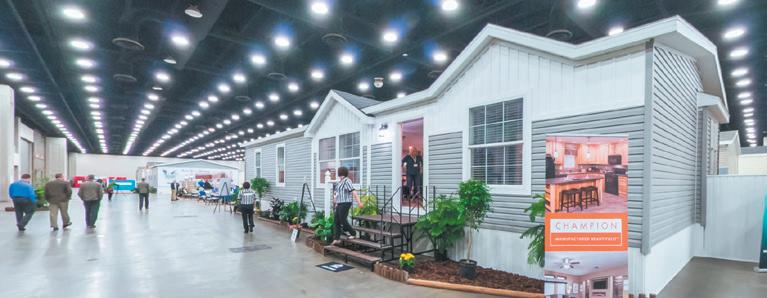
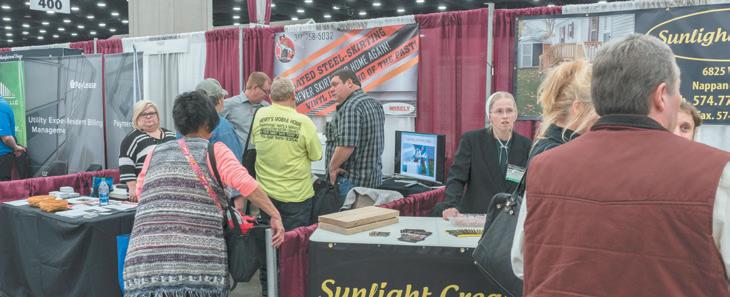


• 57 Model Homes on Display
• Exciting Seminar Programming
• Community Series Homes
• Connect with Top Suppliers/Vendors
• Network with Industry Professionals Register
• KMHI/MHI Appreciation Reception
DECEMBER 2017 ISSUE • 281.460.8384 • ManufacturedHousingReview.com - 14To join, Contact Ms. Della Holland at 281-367-9266, ext. 110 or email at Staff@ManufacturedHousingReview.com Special Advertising rates are available for all six month or more campaigns. JOIN THE MANUFACTURED HOUSING REVIEW AS AN ADVERTISER JANUARY 17-19, 2018 • LOUISVILLE, KENTUCKY
at
Online
TheLouisvilleShow.com
Should You Have an Employee Manual?
You can’t read a publication today without seeing a story related to employee lawsuits. Uber didn’t pay us correctly. Amazon is working us too hard. Bank of America gave us improper incentives. In fact, employeeemployer complaints are the single most litigated class of dispute in America. Proper wage and compensation lawsuits are the single largest subset of employee-employer lawsuits. Unless your small business has Employment Practices Liability Insurance, your business likely has no legal or monetary protection from any claims similar to those noted above, much less for claims of sexual harassment or illegal termination.
Most small businesses don’t have an employee manual. But having a concise well written one that is regularly enforced and followed by all parties is just smart business.
Here are seven guidelines for developing one for your company:
1. Remember, all rules apply to management too; don’t list so many you can’t reasonably comply;
2. Outline your employee benefits;
3. Set-forth your compensation and bonus programs clearly and note what is discretionary;
4. Clearly define allowed and prohibited usage of the internet, email, cell phone and computer usage;
5. Publish that Management has open access to all company emails and computer files and that employees should have no expectation of privacy with regards to data;
6. Add an Arbitration Clause requiring all employeeemployer disputes be handled via the arbitration process, and not in civil court. Include restrictions for the length of the dispute and the amount of discovery that either side may request;
7. Include these items/topics:
• Paid and unpaid time off scheduling including vacations, paid holidays, and sick leave if any;
• Procedure for requesting time off;
• Regular work hours;
Kurt D. Kelley, J.D. Small Business Owner

• What forms the basis of employee performance evaluations;
• Company policies on attire, behavior, gossip, music in the office, hygiene, visits from family and friends, personal cell phone usage at work, and usage of social media;
If you don’t know where to start, seek the advice of a lawyer specializing in employment law, or start with the employee manual of a fellow business owner then customize it for your business. There are also many free office manual templates found online.
http://www.twc.state.tx.us/news/efte/table_of_contents-az.html
http://www.twc.state.tx.us/news/efte/efte.pdf
https://www.shrm.org/resourcesandtools/tools-and-samples/ pages/employee-handbooks.aspx
http://www.nfib.com/Portals/0/PDF/AllUsers/legal/guides/ NFIB-employee-handbook-guide-WEB-2017.pdf
State laws vary on what can and can’t be included in an employee handbook, so be careful when adopting language from businesses in other states. “Legalese” language isn’t required. Clear everyday language often produces the best results. Require that each employee read and sign the manual and place the signature page in their file. Properly setting employee expectations and obligations in writing is a smart business practice.
Kurt D. Kelley, J.D. Small Business Owner Kurt@mobileagency.com
Kurt is President of both Mobile Insurance and Expert Climate Control, small companies totaling approximately sixty employees and doing business in multiple states. And yes, his companies have an employee handbook
DECEMBER 2017 ISSUE • 281.460.8384 • ManufacturedHousingReview.com - 15 -

Texas Manufactured Housing Retailer and Community Owner Investment Corporation of America
Donates One Million Dollars for Hurricane Harvey Relief Efforts
Investment Corporation of America and its Team Members are donating one million dollars to the Red Cross to help with the relief efforts for those devastated by Hurricane Harvey. Investment Corporation of America is owned by John and Carol Bushman. ICA has businesses in several of the affected areas, including the MCM Eleganté Hotel in Beaumont, ICA Radio in Corpus Christi and A-1 Homes in Victoria and Splendora, Texas.
According to the Bushmans
“We are extremely concerned for our team members and their families in these areas. We are praying for them and all our Texas neighbors who are going through this devastating situation.”
The Bushmans and ICA are asking other individuals and businesses in West Texas to match their contribution, whatever they can afford to give.
Everyone is encouraged to donate to the relief effort of their choice, such as the Red Cross, local church efforts or partnering with any one of our local TV and radio stations efforts. Please make checks out to the American Red Cross and deliver or mail to the TV or ICA Radio station of your choice.
Investment Corporation of America owns the MCM Family of Hotels including the Eleganté and FunDome Hotels, Music City Mall, ICA Radio, A-1 Homes, Chickn 4U, Airline Mobile Home Park and many more entities.
DECEMBER 2017 ISSUE • 281.460.8384 • ManufacturedHousingReview.com - 17 -
A Record of Success
So you want to finance a mobile home community...
You’re doing the hard work of owning and operating an apartment or manufactured housing community (MHC) day-in and day-out. Let’s face it: complex finance is probably the last thing on your mind. And that’s OK—because it’s always on ours.
Full service mortgage brokers, we focus on helping you when:
• You are acquiring a MHC or apartment community;
• You could benefit from refinancing. Maybe some cash out?
• Your property needs redevelopment;
• A bridge loan would help close a financial gap; or
• Permanent financing is needed.
Working on behalf of our firm’s new and many repeat clients, our firm has funded loans with banks, Wall Street firms, agency lenders and private lending firms. The capital is used for virtually all types of multifamily real estate, including apartments and manufactured housing communities. Every deal is as unique as the property it funds.
Our clients love our personal touch. We commit to visiting the properties we fund, so that we can present the loan request and collateral with a plan. It’s how we make our clients successful in obtaining the capital they need. We’re an owner, so we think like owners—and we know what it takes to get to a successful closing. Let’s talk.
–Ben Kadish
Introduction
Ben Kadish, President of Maverick Commercial Mortgage, Inc. has developed a niche financing multi-family properties, including manufactured housing communities (MHCs) and house portfolios, and has created a team focused on owners of these properties. The Maverick team helps owners connect with the financing they need to re-finance, acquire or redevelop their properties.
Experience By the Numbers
• 22 years financing MHCs, apartments
• 19 years of MHC ownership
• 11 years in MHC home rentals and finance
• 34 years as a commercial mortgage broker
Ben Kadish

Maverick Commercial Mortgage, Inc.

Office: 312.268.6000
Cell: 312.953.4344
Ben.Kadish@mavcm.com
Loan Amount Size (Sites) Month Closed Purpose Five Seasons Westar Ravinia Estates Pleasant Valley The Elms Cheyenne Mountain Estates Cedar Rapids, IA Shelbyville, IN Fenton, MO Portage, IN Fond Du Lac, WI Colorado Springs, CO $8,000,000 $4,000,000 $5,400,000 $12,050,000 $4,445,000 $5,400,000 390 197 217 328 pad MHC and 246 self-storage units 208 218 July 2017 May 2017 Feb. 2017 Sep. 2016 Oct. 2016 Sep. 2016 Refinance Refinance Refinance Permanent Refinancing Permanent Refinancing Refinance mavcm.com
Learn More:
The Necessity of Checking Your Community Valuations Three Times

There is nothing more important, in any manufactured home community acquisition, than ensuring that your budgets are 100% accurate. These budgets form the bedrock that your finances – and the lender’s – are built on, and cannot be simply a guess. Accurate budgets are essential for a successful investment. And accurate budgets don’t happen on the first take. A smart buyer will check and re-check their budgeted calculations at least three times. The reasons are many.
Facts change during due diligence
Any initial budget on a manufactured home community purchase is based solely on the financials and rent roll provided by the community owner. And, as we all know, they can often be inaccurate (either deliberately or accidentally). As your due diligence expands and all assumptions are checked, it is very common to find that lot rent levels may have been exaggerated, as well as stated occupancy, and costs can be found to be higher than the buyer was told. As these revelations evolve, it requires the buyer to re-state their budget to meet the correct statistics. And this can be a moving target for often the first few weeks of diligence.
The depth of your number crunching evolves as the deal progresses
Additionally, as the due diligence process unfolds, the longer you stay in the deal and see no roadblocks, the more likely you are to spend significantly more time number-crunching. Most buyers’ initial calculations are done on the back-of-anenvelope, followed by a spreadsheet and finally a computer software program. Nobody is going to do their final, most complete budget the day they sign the contract. That would be an insane waste of time, since many deals fall apart right out of the gate, as the initial diligence items are checked. Yet some buyers don’t bother to do a more refined approach, and think that the back-of-the-envelope will suffice. That’s obviously a terrible concept.
Even doctors suggest a second opinion –and what’s wrong with a third, fourth and fifth?
If you went to the doctor and they said “I think you might need angioplasty” you’d certainly get a second opinion from a different doctor, right? Or at last some additional tests. If you’d go to those lengths over an operation, wouldn’t you use that same level of diligence on a transaction in which you have hundreds of thousands of dollars at stake, or more? In addition, can you have too many eyes on your budget, double-checking your analysis? The good news is that most manufactured home community deals get scrutiny from, not only the buyer, but also the appraiser and banker (if a bank
By Dave Reynolds
loan is used for purchase). And that’s great, as these lenders and appraisers often have more experience than you do, and can spot mistakes that you can’t.
There’s no excuse not to play it safe
Benjamin Franklin once said “diligence is the mother of good luck”. He is as correct today as he was 250 years ago. And since the most important part of diligence is creating and verifying accurate property budgets, how can you have completed the task without checking your budget at least three times? Unlike any other third-party report, budget creation is free. As a result, you can’t use the excuse of financial limitation. If you don’t know how to build an accurate budget, you should ask those who do know, and put in the necessary research to understand the process. Have no idea of how a mobile home park even functions? Then you have no business buying one.
Conclusion
Every manufactured home community buyer must have an accurate budget. To ensure that you have achieved this, you need to check your numbers at least three times. It’s the only way that you can be sure that you can hit your budgets, and this is the tool that makes success achievable and risk mitigated.
Dave Reynolds has been a manufactured home community owner for almost two decades, and currently ranks as part of the 5th largest community owner in the United States, with more than 23,000 lots in 28 states in the Great Plains and Midwest. His books and courses on community acquisitions and management are the top-selling ones in the industry. He is also the founder of the largest listing site for manufactured home communities, MobileHomeParkStore.com. To learn more about Dave’s views on the manufactured home community industry visit www.MobileHomeUniversity.com.
DECEMBER 2017 ISSUE • 281.460.8384 • ManufacturedHousingReview.com - 19 -



Page—32 GREAT RATES ~ GREAT SERVICE ~ GREAT VALUE Retailers Communities Developers Installers SPECIAL INSURANCE PROGRAMS Transporters Homeowners Tenants Investors
MHR MANUFACTURED HOUSING REVIEW We are an electronically delivered monthly magazine focused on the Manufactured Housing Industry. From Manufactured Home Community Managers, to Retailers, to Manufacturers, and all those that supply and service them, we supply news and educational articles that help them run their businesses. 281.460.8384 ManufacturedHousingReview.com Communications regarding any alleged offending, inappropriate, inaccurate or infringing content should be directed immediately to kkelley@manufacturedhousingreview.com along with the communicator’s contact information. Have something to contribute or advertise? Email us at staff@manufacturedhousingreview.com












 By Della Holland, Assistant Editor
By Della Holland, Assistant Editor
















